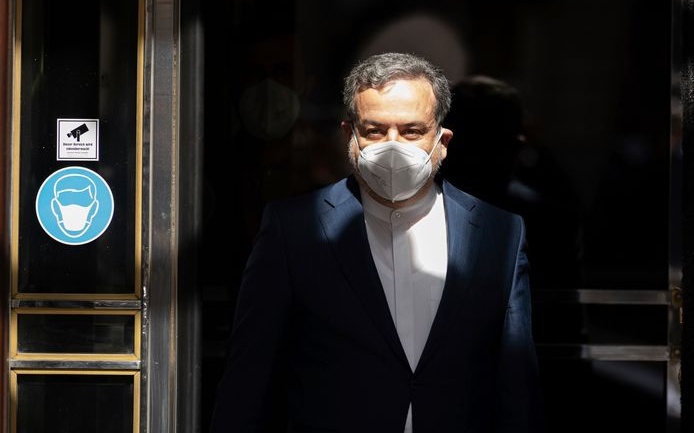Iran Deputy Foreign Minister Abbas Araqchi leaves the Grand Hotel Wien, site of indirect nuclear talks, Austria, Vienna, April 9, 2021 (Florian Schroetter/AP)
UPDATE, APRIL 18:
Iran’s indirect nuclear talks will continue next week, amid a positive signal from the head of the Iranian delegation.
The Joint Commission convened on Saturday to review the discussions, with the European Union and the remaining powers in the deal (UK, France, Germany, China, and Russia) as brokers between Iran and the US.
Iranian Deputy Foreign Minister Abbas Araqchi spoke of a “new understanding” in the talks, with groups on the technical aspects and on sanctions.
“There is now a shared view of the end goal between all sides and the path that needs to be taken is a bit better known,” Araqchi said.
But the minister also cautioned, “It won’t be an easy path — there are some serious differences that will need to be resolved.”
The European Union’s coordinator Enrique Mora echoed Araqchi.
After intensive talks we have taken stock in the Joint Commission. Progress has been made in a far from easy task. We need now more detailed work. Key that everyone is committed to the same objectives: US rejoining the #JCPOA and its full implementation. pic.twitter.com/84CDnzC4nf
— Enrique Mora (@enriquemora_) April 17, 2021
Russia’s Mikhail Ulyanov summarized, “The participants took note with satisfaction of the progress made so far and expressed determination to continue negotiations with a view to complete the process successfully as soon as possible.”
However, in a sign of an ongoing hard line by Tehran, State outlet Press TV — used by Iranian officials to signal their views and intentions — quotes an “informed source” that “only the removal of all sanctions together against Iran will save the Vienna talks”.
UPDATE, APRIL 17:
Iran is claiming that it has enriched uranium to 60% purity, further breaking the limits of the 2015 nuclear deal.
Maintaining the defiance of last Sunday’s damaging attack — probably by Israel — on the Natanz nuclear plant, Atomic Energy Organization head Ali Akbar Salehi issued the announcement on Friday.
#Iran nuclear chief Salehi: On Wednesday, we ordered launching 60% enrichment & late Thursday we could produce it. 9 grams of 60% is produced in an hour now. Simultaneously we'll produce 20% in those two cascades… Enrichment never stopped in #Natanz & only one hall had problem.
— Abas Aslani (@AbasAslani) April 16, 2021
Salehi’s statement came soon after Parliament Speaker Mohammad Baqer Qalibaf told legislators that “Iranian scientists reached 60% enriched uranium product” at 12:40 a.m. local time.
President Hassan Rouhani went farther, proclaiming, “We can enrich to [military grade] 90% today, but we stand by our word and we are not looking for an atomic bomb.”
Talks continued in Vienna on Friday, with Iranian media highlighting Deputy Foreign Minister Abbas Araqchi’s sessions with the Russian and Chinese representatives — seen as more sympathetic to Tehran’s positions than the European Union and the European trio of the UK, France, and Germany.
A “senior EU official” said talks, on technical aspects and sanctions, were expected to continue for a few days. Delegations would then return home for internal discussions. The official said there was no idea whether progress had been made.
"We do not support and do not think it's at all helpful that Iran is saying it's going to move to enrich to 60%," Pres. Biden says, but adds he's "pleased that Iran has continued to agree to engage in discussions…on how we move forward."
Read more: https://t.co/wf6b4v6B9H pic.twitter.com/J9f3w7uoy8
— ABC News (@ABC) April 16, 2021
ORIGINAL ENTRY: Indirect talks over the 2015 Iran nuclear deal resumed on Thursday in Vienna.
The discussions are between brokered by the European Union and the powers in the agreement (UK, Germany, France, Russia, and China), shuttling between Iran and the US. The EU’s coordinator Enrique Mora tweeted:
Good to see everybody back in Vienna ready to advance our talks, despite very challenging events and announcements over the past days. Working towards the same objectives: US rejoining the #JCPOA and its full implementation. pic.twitter.com/Ws7iipKTLf
— Enrique Mora (@enriquemora_) April 15, 2021
The talks opened last week in the Austrian capital, but made little progress over US re-entry to the deal. The Trump Administration withdrew in May 2018 and imposed comprehensive sanctions, including on Iran’s energy and financial sectors, six months later.
The Biden Administration is offering a “sequenced” approach, linking removal of sanctions to an Iranian return to compliance with the deal. Iran has publicly set the pre-condition of a full lifting of the sanctions before discussions progress.
On Wednesday, Iran’s Supreme Leader endorsed the resumption of talks, despite Sunday’s damaging attack — likely overseen by Israel — on the Natanz nuclear complex. But Ayatollah Khamenei derided the US and Europeans, and repeated the precondition of sanctions removal.
See also Iran’s Supreme Leader: Indirect Nuclear Talks to Continue with US
Iranian officials responded to the Natanz attack by declaring that they will begin enrichment of 60% uranium, further breaking the provisions of the deal.
The agreement limits Tehran to 3.67% uranium. In January, Iran returned to its pre-2015 level of 20% and installed cascades of advanced centrifuges.
Two working groups, on technical aspects and on sanctions, have begun consultations in Vienna.
“Currently I think the nuclear working group is more advanced, much more advanced, than [the] sanctions-lifting working group,” Wang Qun, China’s Ambassador to the International Atomic Energy Agency, said after Thursday’s meeting of the Joint Commission.
Iran’s Foreign Ministry maintained a defiant line, chiding European powers for a “weak reaction” to the Natanz attack.


People are dying by hundreds everyday from covid. WHERE IS THE VACCINE? nuclear medicine bokhorh tu saratoon(never mind nuclear medicine)
How many nuclear-powered vessels iri has????
Iran confirms production of uranium at 60% purity: https://www.presstv.com/Detail/2021/04/16/649598/Iran-says-it-produced-first-batch-of-60-percent-enriched-uranium-products
The highly enriched uranium can be used in radiomedicine and can also be converted into fuel for nuclear-powered propulsion.